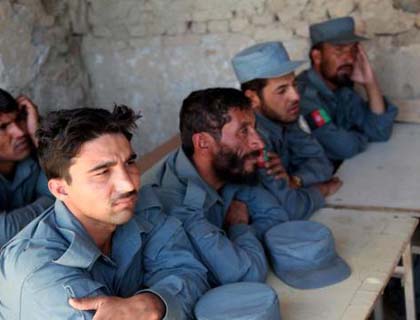LASHKARGAH - When NATO forces in Afghanistan caught an opium producer with 15 kgs (33 lbs) of drugs, they might have expected his family to plead for his freedom. Instead, an Afghan police officer appealed to foreign troops to release him. The drug-trafficker stayed in prison, but the British army officer who described the incident said it was symptomatic of the corruption problems Afghanistan's police force is grappling with, even as they are being asked to step up and play a greater role in securing the country.
This week marks the start of a years-long transition, with security control of seven areas of Afghanistan handed over from NATO troops to the Afghan police and army.
The aim is for the whole country to be under control of national forces by the end of 2014.
Afghanistan's Western backers have poured billions of dollars into improving and expanding the security forces, whose combined numbers should reach 305,000 by October, as part of this process. It has also cost the lives of dozens of mentors.
British soldiers who work with Afghan police in southern Helmand province say they have become more professional, thanks to higher pay, training and support from foreign forces.
There has been heavy investment in new vehicles, police posts and headquarters in Lashkargah, the provincial capital, which is due to be handed to Afghan forces Wednesday.
"There is still the odd rotten apple in there that we are trying to either train, improve and wean of his old habits, or just get rid of, but generally there is a groundswell of improvement," Lieutenant-Colonel Fraser Rea, commander of Britain's Police Mentoring and Advisory Group, told Reuters. He said the regional training centre, which has about 70 British trainers, had turned out over 3,000 new police officers in recent years who were making a real difference in Helmand.
CORRUPT, ILLITERATE
But corruption is still pervasive, if hard to measure in an area where few of their mentors speak the language or have much training in the local culture.
"To find out the actual level of corruption is incredibly difficult," said Captain Freddie Inglefield, who is in charge of mentoring Afghan police in the Nad Ali district of Helmand.
He believes much of the corruption problem is perception among a population long used to it, rather than reality, and says the police are improving.
He cited as evidence a rising number of people going to the police about land disputes or other problems that they would once have taken to a Taliban judge.
Not everyone is as optimistic. Recent examples of corruption have included bribery to get people into jobs, extortion for the right to use a road and siphoning off part of a consignment of wheat seed, another officer in Helmand said.
The police are also weakened by widespread illiteracy, with some 90 percent of recruits unable to read or write.
"The majority of patrolmen are illiterate," said Major Marcus Reedman, deputy commander of the Police Mentoring and Advisory Group.
"Clearly if they are going to be a checkpoint commander, they need to be able to read a set of orders from the precinct commander, they need to be able to take a statement... And at the moment, they can't."
Instructors teach reading and writing as part of a police officer's eight-week basic training and there is a further eight-week course to become a non-commissioned officer. Officials are looking at extending courses to provide more intensive literacy training, Reedman said.
RISKS OF WAR
Afghanistan has several types of police force but most are paramilitary forces focussed more on security than crime, which increases the risks police face.
There is intimidation against serving policemen and their families at home, with the Taliban threatening kidnap or targeted killings. On bases there is the risk of conventional attack, or infiltrators among their own ranks.
Seven police officers near Lashkar Gah Monday were poisoned and then shot by a fellow policeman, and there are frequent roadside bombs, suicide bombers and all-out attacks.
A parking lot outside Lashkar Gah police headquarters has been turned into a graveyard for mangled police vehicles, many of them hit by improvised bombs or pierced by shrapnel.
"This is war that's going on in Afghanistan and it's a long, long road," said Lieutenant-Colonel Shadi Khan, Nad Ali's police chief. (Reuters)

